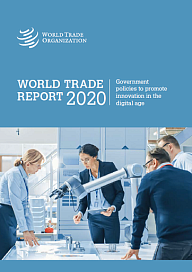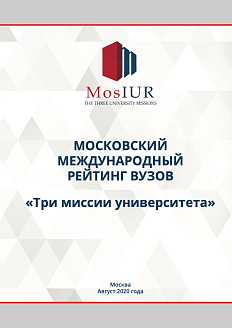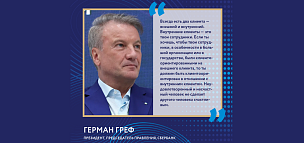The 2020 World Trade Report looks at the role of innovation and technology policies in an increasingly digitalized world economy and explains the role of the WTO in this changing context.
Analysts of the Roscongress Foundation have identified the main theses of this study, accompanying each of them with a relevant piece of video broadcasts of panel discussions held as part of the business programs of key events held by the Foundation.
Government regulation of modern international trade is largely centered around high-tech goods and digital services. In many countries, the state regulatory policy combines tools for developing and stimulating the export of digital economy products, as well as reducing the risks of cross-border transfer of end-user data.
Government policies today are increasingly oriented towards the promotion of innovation in the digital sectors. Over the past decade, R&D expenditure in services linked to information and communication technologies has grown from 10.8 per cent to 14.2 per cent of global R&D spending. Governments support innovation and the development of the digital economy through a mix of traditional policy instruments and new regulatory approaches. Traditional policy instruments range from direct and indirect public funding for R&D to the elimination of import tariffs (including under the WTO Information Technology Agreement), innovation- and digital-oriented public procurement, local content requirement measures, the development of standards and the promotion of high-tech clusters and tech hubs.
The specific features of the digital economy have also led numerous governments to broaden their policy toolboxes and develop new regulatory approaches. These new approaches aim to foster digital innovation through instruments like regulatory sandboxes (i.e. where businesses can draw on the expertise and advice of a regulator and test their products under less stringent regulatory requirements) and data-sharing schemes. They also aim to address digital challenges through interventions like data flow restrictions, data localization requirements and taxation.
Removing unnecessary trade barriers increases innovation within countries and maximizes the benefits of innovation both domestically and in international trade.
Open and transparent trade policies contribute to innovation through improved access to foreign markets and increased competition, which provide firms with incentives to invest more in R&D. This is true for both developed and developing economies: a study of 27 emerging economies shows that both competition from foreign firms and linkages with foreign firms, through importing, exporting or supplying multinationals, increase product innovation, the adoption of new technologies and quality upgrading. Imports of capital goods and intermediate inputs improve productivity, product quality and diversity; the interaction between domestic and foreign firms, through backward and forward linkages, favours technological diffusion; face-to-face interactions within international production and research networks help the diffusion of tacit knowledge and promote knowledge spillovers. Open and transparent data policies are also important contributors to innovation in the digital age.
Other government policies can be beneficial for innovation. R&D spending and, in some cases, increase patenting activity. Government research spending and procurement have a generally positive impact on innovation. Recent research shows that public funding of university research leads to more patents being filed by private firms. Government research grants allocated in a competitive way to private firms generally succeed in stimulating private R&D. The effect is particularly prevalent for small firms, which are more likely to experience external financial constraints. Governments can also have a large impact on innovation through procurement policies, especially those directed towards sectors and firms with high technological content.
In the context of collapsing international institutions, it is important to understand that the regulation of international trade in innovations is most effective in the format of responsible and consistent interaction within the framework of supranational forums such as the WTO.
Innovation policies, like other components of government policies, serve domestic policy objectives. They can generate both positive and negative international spill-over effects. In both regional and multilateral fora, governments have negotiated disciplines which regulate the use of policy instruments with a view to maximizing these positive cross-border spillovers and to limiting the negative ones, without impeding the pursuit of legitimate public policy objectives. Multilateral and regional agreements have contributed to shaping innovation policies for many years, with continued relevance in the digital age.
The WTO agreements reached a quarter of a century ago proved to be remarkably forward-looking in providing a framework that helped to foster the development of an ICT-enabled economy in countries across all levels of development, while preserving policy space for countries to pursue different models of digital development. Since its inception, the basic principles of the General Agreement on Tariffs and Trade (GATT) (and, today, those of the WTO), such as non-discrimination, transparency, reciprocity and the prohibition of unnecessarily trade- restrictive measures combined with the preservation of policy space for addressing important societal concerns, have promoted trade liberalization and innovation. These principles, although they pre-date the emergence of digitalization, continue to promote innovation in the digital world through the more sophisticated and detailed disciplines contained in the WTO agreements.
We also invite you to familiarize yourself with other materials posted in special sections of the Roscongress Information and Analytical System Trade Policy, Protectionism and Digitalization, devoted to development of world trade.





